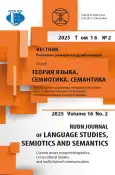Reverse Derivation in the Russian Language and the Speech Activity of Children and Adults
- Authors: Dobrova G.R.1
-
Affiliations:
- Herzen State Pedagogical University of Russia
- Issue: Vol 16, No 2 (2025): Current issues in psycholinguistics, cross-cultural studies, and multichannel communication
- Pages: 365-380
- Section: PSYCHOLINGUISTICS
- URL: https://journal-vniispk.ru/2313-2299/article/view/323517
- DOI: https://doi.org/10.22363/2313-2299-2025-16-2-365-380
- EDN: https://elibrary.ru/IXZXSM
- ID: 323517
Cite item
Full Text
Abstract
Reverse word formation occupies a much more significant place among other methods of word formation than is commonly believed. If in language there are indeed rare cases of words arising through reverse derivation, then in the speech activity of both adults and children, cases of reverse derivation are quite frequent. The study provides examples of the construction and use by adult native speakers of words formed using reverse word formation, and concludes that the widespread use of such words in the speech of adults is hampered only by control, which does not allow an adult native speaker to use an occasional word mentally formed by him in speech. In children, due to insufficient speech experience, control does not yet operate fully, and therefore children often use occasionalisms formed through reverse derivation in their speech, which is proven by data from recordings of children’s spontaneous speech. In addition, the study is based on data from an experimental study that tested children’s tendency to reverse word formation (80 children: 16 children 4 years old, 16-5 years old, 16-6 years old, 16-7 years old and 16-8 years old). As a result of the analysis of the experiment, it was concluded that the “peak” tendency for reverse word formation in children is observed at 5-6 years of age (when the method of reverse word formation has already been mastered, and control has not yet been fully included). It was also revealed that compensatory verbal creativity, caused by ignorance of a common word, is replaced by conscious creativity gradually, over several years, and the time of transition from compensatory creativity to conscious creativity in the field of word formation is determined by the time the child masters one or another word formation model, the speed of this transition - individual characteristics of children. In general, the results of the study force us to look at reverse derivation from a new angle - as an important fact of an individual’s speech activity.
About the authors
Galina R. Dobrova
Herzen State Pedagogical University of Russia
Author for correspondence.
Email: galdobr@peterlink.ru
ORCID iD: 0000-0001-8007-1973
SPIN-code: 5025-4952
Scopus Author ID: 57209316374
ResearcherId: C-3837-2018
Dr.Sc. (Philology), Professor, Professor of the Department of Language and Literary Education of the Child
48, Moika Embankment, St. Petersburg, Russian Federation, 191186References
- Tseitlin, S.N. (2009). Essays on Word Formation and Form Formation in Children’s Speech. Moscow: Znak. (In Russ.). EDN: RWKKTL
- Vinokur, G.O. (1959). Notes on Russian Word Formation. In: Selected Works on the Russian Language (рр. 419–442), Moscow: Uchpedgiz publ. (In Russ.).
- Fufaeva, I.V. (2016). Expansion of expressive diminutives in Russian. Vestnik of Lobachevsky University of Nizhni Novgorod, (3), 257–266. (In Russ.).
- Ulukhanov, I.S. (2008). Units of the Word-Formation System of the Russian Language and Their Lexical Implementation. Moscow: RAS, The V.V. Vinogradov Russian Language Institute of the Russian Academy of Sciences. (In Russ.).
- Tseitlin, S.N. (2013). Speech Failures as a Kind of “Negative Linguistic Material” In: Conf., Dedicated to the 150th Anniversary of the Department of General Linguistics of St. Petersburg State University, Theses, (pp. 99—101). Saint Petersburg. (In Russ.). EDN: UJDFRZ
- Tseitlin, S.N. (2017). Speech Failures in the Formation of Verbal Forms In: Russian verb (to the 50th Anniversary of the Publication of the Book by A.V. Bondarko and L.L. Bulanin): Abstracts, (pp. 165–166). Saint Petersburg. (In Russ.). EDN: ZRZMGT
- Tseitlin, S.N. (2019). Verbal Inflectional Slips in the Speech of Native Speakers of the Russian Language. ACTA LINGUISTICA PETROPOLITANA, 3(15), 134–157. https://doi.org/10.30842/alp2306573715306 (In Russ.). EDN: FERCUC
- Tseitlin, S.N. (1978). Back-formation in Children’s Speech In: Psycholinguistics’ Studies (Speech Development and Theory of Language Learning). Moscow: The Academy of Sciences of the Soviet Union, Institute of Linguistics, (pp. 61—66). Moscow. (In Russ.). EDN: SZHQXP
- Tseitlin, S.N. (2013). Linguistic Essays. Saint Petersburg: A.I. Herzen State Pedagogical University. (In Russ.). EDN: RXZPEF
- Gridina, T.A. (2012). Explanatory Dictionary of Children’s Innovations. Yekaterinburg: USPU. (In Russ.). EDN: QNPVEF
- Gridina, T.A. (2018). Metaphors in Children’s Speech as a Phenomenon of Linguocreative Thinking and Poetic Ability. In: Linguistics of Creativity-4: a Collective Monograph, (pp. 11–39). Yekaterinburg. (In Russ.).
- Gridina, T.A. (2003). Ontolinguistics. Yekaterinburg: USPU. (In Russ.). EDN: QQUWLT
- Dobrova, G.R. (2012). Language Protest as One of the Manifestations of Metalinguistic Activity — Why not All Children? In: Problems of Ontolinguistics-2012. Materials of the International Scientific Conference Dedicated to the 130th Anniversary of the Birth of K.I. Chukovsky and the 120th Anniversary of the Birth of A.N. Gvozdev, (pp. 467–472). Saint Petersburg. (In Russ.). EDN: RWSRRN
- Dobrova, G.R. (2017). Children’s Statements about Language in Dynamics: on the Example of one Child. Psycholinguistic Aspects of Speech Activity′s Study, (15), 17–32. (In Russ.). EDN: YPZQOF
Supplementary files









